- Home
- Nick Carter
Saigon
Saigon Read online
Annotation
WHEN SPY MEETS SPY.
An unforgettable game of counterintelligence pitting America's super-secret AXE organization against the Chinese assassination bureau, BITTER ALMONDS… and Killmaster himself against a female double-agent whose technique was irresistible.
* * *
Nick Carter
Death and The Fair One
He Got His Job Through The Vietnam Times
La Dolce Vita Vietnames
Meet Mr. Fang
Saito, Where Are You?
Miss Antoinette Cleans House
The Inexperienced Spy
Friday Night
And Saturday Morning
Ready — Gel Set — Go!
Almost Everything Is Jake
Claire Has Company
I Couldn't Help It General; I Lost My Head
Killmaster Meets The Lady
Love Is Love But War Is Hell
* * *
Nick Carter
Killmaster
Saigon
Dedicated to The Men of the Secret Service of the United States of America
OCR Mysuli: [email protected]
Death and The Fair One
The blue-green skies of Vietnam shed their brilliant gleam over scenes of sheer postcard beauty and stark horror.
Paddy fields rise gently in curving terraces at the foothills of the mountains which border the La Farge plantation in Communist-held North Vietnam. To the south the wooded hills slope down toward splendid cities and soft sandy beaches that stretch like mammoth carpeting tacked onto the South China Sea. Inland, yet embracing a deep inlet of the sea, lies the harbor capital of Saigon… four hours and fifteen minutes by air from Manila, two and a half hours by air from Singapore, and light years away from the La Farge plantation on the northern side of the partition line.
Madame La Farge lay back under the steaming August sun and thought about it. The heat and the remoteness of Saigon were among the few things left for her to think about.
For Claire La Farge, an excursion into Saigon could once have been accomplished in a series of seventy-mile-per-hour sweeps over the improved roadways and dizzying corkscrew passes in her custom-built Royal Roadster. Once, but not any more. Madame La Farge was virtually a prisoner in her own castle in the foothills. For one thing, the Roadster was no longer hers. Ho Van Minh had admired its aging beauty and commandeered it for his staff car. For another, Madame was under orders to restrict her movements. And finally, even supposing she had been free to travel, she could see no good reason to go dashing over hill and dale through the ragged lines of conflict drawn between the North and South. Vietnam, these days, is no place for making unnecessary trips. Even in the friendly southern mountains, where big-game hunters cross the thick forest in search of leopard, tiger and wild boar, the most dangerous of all Vietnamese creatures is to be found: the Viet Cong guerrilla.
So Madame Claire La Farge no longer traveled.
And yet she was no ordinary woman. No one expected a beautiful Frenchwoman to be ordinary, and the Madame was no exception. She was a widow, breathtakingly lovely; once a devoted young wife with no thought but to quietly adore her handsome husband, and now a tough-minded businesswoman who ran Paul's plantation with a firm but gentle hand. The vast legions who helped her maintain the richest lands in the territory viewed her with love and respect. When they called her the "Fair One," as all but one or two of them did, they paid tribute not only to her beauty but to the scrupulous fairness and honesty that had attracted Paul La Farge to her in Hanoi almost twenty years before this cruel August day.
Claire turned over in the sun. There are two seasons in Vietnam, and both of them are summer. One is dry and one is wet. The sun was shining after thirteen days of torrential, steaming rain. Everything on the plantation was going as well as could be expected. There was nothing whatever to do, and no novelty in sight except the sun.
So Madame La Farge sunbathed in the nude. Not to be wanton and certainly not to shock the help. Merely to take advantage of the sun and be as comfortable as possible.
Her body, stretched out on Paul's own version of an elegantly comfortable patio hammock, was long, bronzed and abundantly curved. Even in her exquisite nakedness she looked unmistakably French. Indeed, Madame Claire La Farge was the very embodiment of French femininity at its marvelous best, a romantic dream in the gorgeous flesh. Even now, with her breasts rising like twin-crested hills into the baking sun of a land so far from France, she seemed Forever French. Her short-bobbed black hair swept back from a classic forehead. A slender nose with delicately pinched nostrils divided high cheekbones whose message of aloofness was contradicted by the full, sensuous mouth — a mouth that now found little to make it curve into a laugh — but which had known laughter in its time. She lay like a sun goddess, surrounded by the low stone wall which ran around the southern tip of the patio which the help had erected in the long-ago when the plantation, and Madame, were both quite young.
But the wall served as little protection from whatever might come. It had been built as a decoration, a low dividing line between the lands and the La Farges' private life. Paul had been the only protection she had ever needed.
Now, at 36, Madame had nothing to protect her but a screen, and the old Army.45 tucked casually between the pillows of the hammock. Paul La Farge, the handsome, laughing devil of the war years and French Intelligence, had been dead for ten cruel and empty years. His code name had been La Petite Fleur. La Petite Fleur! She could still smile when she thought of it — that laughably fragile label for a man of great muscular strength, well-versed in every phase of hand-to-hand combat and coldly merciless in his dealings with the enemy. But warm and gentle with her… strong, warm, gentle, passionate… a memory of strength and sweetness, love and laughter…
He had met her in Hanoi at the end of World War II, wooed and won her even though she was more than ten years younger than he and surrounded by panting young suitors. Then he had taken her to the plantation his family had owned for half a century and left to him to run. And he ran it well, as he did everything, but he had another and more important job to do. He was still La Petite Fleur of French Intelligence. And the French were fighting bitter battles to keep the Communists from wresting control of Vietnam.
Now the North was lost to them. So was Paul.
La Petite Fleur had done his undercover work for the French Government for eight long, hazardous years. A dozen times he had been close to death, and a dozen times he had slipped through his enemy's fingers to come home to Claire and the plantation. At last, only weeks before the bloodiness of Dien Bien Phu, his superiors sent him orders to lie low for a while, be an innocent French planter and nothing else until fresh orders came. He hated the thought of inactivity, but Claire was relieved. They needed time together, a short breathing spell.
Then came the assassin's bullet crashing across the darkness of the Vietnamese night.
Claire La Farge was a widow at an age when women most need their men to love them.
Now she had only the plantation and her memories of Paul and his great love. Only heat, rain, rice and tea to occupy her mind.
She stirred again in the sun and sighed. That wasn't true. She had other things to think of. The people who worked her land, for instance. They needed her. Without her guidance the L4 Farge lands would be an unproductive shambles within a matter of seasons. She had had a choice. "Get out and stay out. Let your lackeys fend for themselves." "Stay here. Let them keep their jobs. The house is yours, and such food as you need. But the rest is ours. The land produces for us." So endeth speech by North Vietnamese General Ho Van Minh.
So she had stayed. In Paul's home. But, in fact, even the plantation was no longer hers. Time was marching on, going nowhere, taking her youth along wit
h it. Giving her little to think of but the heat, the rain, the rice, the tea, her plantation hands, the produce going to feed the enemy, the terrible business of the Vietnamese conflict that threatened to plunge the world into the holocaust of World War Three…
Claire swore to herself. Nothing to think about! She had the world itself to think about and she lay here like a lump of clay, useless. Frustration burned within her as hotly as the sun. And burned itself out in a sudden blaze. She was restless, that was all. Maybe she could persuade Minh to let her go into Saigon for supplies. In fact, she had already set the wheels in motion by sending him a message. The trip would do her good. Apart from that, there wasn't a damn thing she could do about the world situation and the communist menace. With Paul gone, it didn't matter any more. Nothing mattered any more.
The sun beat down, sending its rays like a lover's fingers into the warm recesses of the Madame's curved length on the unmoving hammock. She kept her eyes locked against the glare even though heavy sun glasses with jewel-crested harlequin rims shielded them. The torrid waves of close atmospheric pressure held her in flaming hot fingers. Her body shivered briefly with a sensation of love and almost forgotten passion. If only she could once again find a man like Paul to make her feel as she did under the caress of the sun…
She did not see the tall shadow that fell across the patio beyond the screen, but she heard the soft footstep that brushed the silence. She did not stir, neither did she reach for the.45.
"Yes, Saito?"
She knew his step, the light catlike tread of the giant who had been with Paul since fleeing the Japanese mainland in 41 to fight against the warmakers among his own people. After the French collapse of 1954 he had remained in Claire's employ. It is thought that it was he who first called her the "Fair One" and gave rise to a living legend.
"My lady, there will be no safe conduct for you to Saigon. The General is not of a mood to offer you the courtesy. And I beg that you do not try to undertake the journey in some other way."
There was worry in the soft, gentle voice of the foreman. The Madame, quick to sense the wants and needs in her people and ever ready to honor their unfaltering concern for her well-being, did Saito the courtesy of sitting up and giving him her whole-hearted attention. He could not see her from behind the screen, but he could hear each move she made and he knew that she sat up to listen to him. He also knew that she was naked. But he made no attempt to look around the screen and she had no thought of reaching for her silken robe. Saito, as her foreman and trusted manservant, was rendered the supreme compliment: her certainty that her virtue, her very being, were safe when he was near.
"So the General is being difficult," she said, without surprise. "But you are worried, Saito. May I ask why?"
"There is trouble in the land."
"There is always trouble in the land. What is it that so disturbs you today — the General?"
For all her French inflection, the Madame's Vietnamese rang true and clear. Though Saito understood her native French as well as English, it always seemed to her more natural to speak the local tongue.
"Not only the little General." Saito's voice was tinged with scorn. He had disliked Ho Van Minh on sight and had found no reason to change his mind. "Something has angered him so that he refuses completely to let my lady step foot off the plantation. He even dared to threaten punishment should you disobey him."
"Did he, now?" she murmured thoughtfully. "And what important news have you for me?"
"That he means it this time, Madame. There have been bombing raids and several battles of late that have not gone to his liking. And it is true that it is even more dangerous than before to venture forth. The skies are becoming full of planes that drop men like seeds into the fields and there are death traps on all the roads. And word comes from Saigon that there will be more demonstrations there, more bombs. Communist pigs and sign-bearing animals will walk again and kill again. Do not become restless, Madame, I beg you. The journey is impossible."
She understood the worry in him. It was true that she was headstrong, and more than once she had defied the General. But even that was no longer worth the effort.
"Do not alarm yourself, Saito. I shall remain where I am."
"It is well, Madame. Do you still wish to have speech with the General?"
She looked at the screen as though she could see Saito standing behind it. In her mind's eye, she did see him, a completely atypical Japanese — far too tall, far too Western-looking. He was a good six feet tall and blockily built, his enormous arms dangling apelike at his sides. The Black Belt was his, as were countless other honors in Judo, Kendo and Karate. No one had ever bested Saito. And no one ever would, except his late master's lady. For all his imposing stature, he was like a small boy when it came to Claire La Farge.
"No, Saito. I will not trouble the busy General. I have no interest in crossing the 17th Parallel if it means so many tiresome difficulties. What difference does it make, after all? No, I shall remain here, seeing no one, being only the Lady of the Plantation." Her tone mocked her words, for no one knew better than she that the Lady was a helpless captive.
Saito bowed behind the screen. "My lady, as always, shows good sense."
She laughed. He, too, sounded just a little mocking. They both knew that she did not always show good sense. But there was no lack of respect in his faint mockery.
"Has The Times of Vietnam arrived yet, Saito?"
"Within the hour, my lady."
"Bring it to me when it comes. With a glass of sugarcane and orange. That is all, Saito."
She knew that he was bowing his way across the patio even though he knew his courtesy could not be seen. A comforting giant, she thought, to have at one's side. Not like a husband, though; not at all like a strong, loving husband… Madame La Farge shut her thoughts tightly away and concentrated on sleep. The sun would help. It would touch her nakedness warmly, hold it like a lover's embrace and drain all the fight out of her…
The sun did help. She drowsed.
Somehow she sensed the shadow falling across her body even before she heard the sound. It was later. She could not tell how much later, but the sun told her it was less than the hour she had expected to wait for Saito. And she knew by the footfall that the shadow was not Saito's; that this was someone who had stepped across the La Farge threshold for the first time. She opened her eyes slowly, and this time she did reach for her robe. The shadow falling from behind the screen was coming closer. Her hand stole beneath the pillows for Paul's.45.
The man staggering toward her was dying. She had seen enough of death to know its face immediately.
He came lurching toward the swaying hammock, half-dragging himself across the flagged stones of the patio. She sat up quickly, drawing the robe around her and pointing the.45 firmly at the ragged intruder. She was not afraid. Vaguely alarmed, curious, but not afraid. A wounded guerrilla, she thought, and waited for the man's demand for help.
The derelict halted, a pitiful sight in torn broadcloth breeches and leather vest flapping open to show a stained, sweaty, yellowish body. She saw taut skin stretched over bone and wiry muscle, veins and tendons that were distended knots, a face that showed the agony of his wasted frame. His face was predominantly Indo-Chinese, but she could see the Frenchman within the racked and tortured body.
He swayed at the foot of the hammock. And there was something strangely familiar about the twisted features.
"C'est vous, Madame La Farge? Je suis…"
She could only nod as he fell to his knees before her, his hands clawing at something at his waist. His black, badly-trimmed hair hung wildly from his scalp and the parched lips moved wordlessly. The torn and bleeding fingers fumbled clumsily, trying to take something from its hiding place and urge it on Madame, but the body was incapable of doing what the brain commanded.
She reached toward him.
"Madame…" the voice croaked. "Message! Not… not… not…" He staggered back, his words an indistinguishable
hiss of dying sound. Then his voice rose. "Not so!" it seemed to say. And: "Vive la France!"
This last was an agonized but somehow triumphant shriek. The Madame was too late to catch the corpse that fell across the foot of her sun hammock. It was only then that she saw the dreadful scars through the torn fabric on the man's mutilated back.
Madame La Farge did not scream. Paul La Farge had trained her too well. She clapped her hands three times with sharp, stinging emphasis. Saito would hear, and come.
Swiftly, she knelt and felt the man's heart. Death again. Like older, even harder times. French mixed with English, and the face of an Indo-Chinese… He had known her. Where could she have known him? Her fingers ran lightly over his body, looking for the message. No pockets, no paper, no locket around the neck.
The dead hands were still clutching at the soiled trouser band, at a belt, made of rope strands curiously knotted. Gently but firmly she pried the locked fingers of the corpse apart. The message must somehow be tied up in that belt.
Not so, as he had said. Not so. Unless it was threaded into the crude weave, held together by those thin, irregular knots, there was no message in the belt. But there had to be.
She took the belt off the dead shell of the man who had died for France and scrutinized it thoughtfully, hearing Saito's sandals making slapping leathery sounds from within the house.
"Not… not… not… Not so…!" Nots. Knots. There were many ways of hiding messages. This was one. And now she knew the man.
Merciful God! she thought. Why was Paul La Farge dead? He would know exactly what to do.
Madame La Farge's raven-black eyebrows knit in a furious scowl. Curse this man, dying at her feet with his unintelligible knots. They meant nothing to her, and there was nothing she could possibly do about them. This whole awful incident was a tedious nuisance.
Nevertheless, her heart had lifted in the strangest way. This man had made his way, deliberately, to the wife of La Petite Fleur. And Paul had never let a man down in his life.

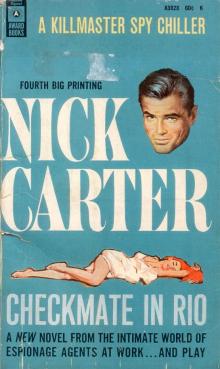 Checkmate in Rio
Checkmate in Rio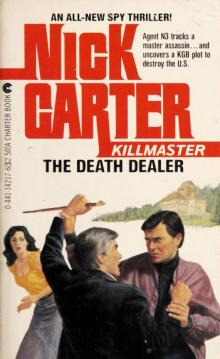 The Death Dealer
The Death Dealer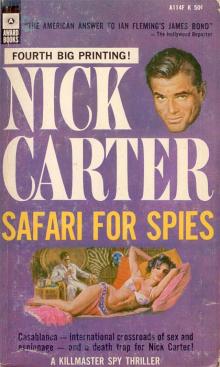 Safari for Spies
Safari for Spies Berlin
Berlin The Death’s Head Conspiracy
The Death’s Head Conspiracy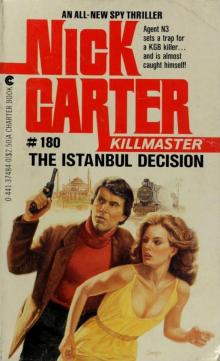 The Istanbul Decision
The Istanbul Decision The Liquidator
The Liquidator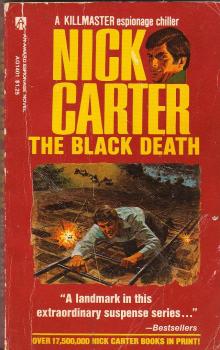 The Black Death
The Black Death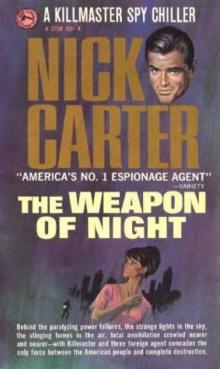 The Weapon of Night
The Weapon of Night The Berlin Target
The Berlin Target Temple of Fear
Temple of Fear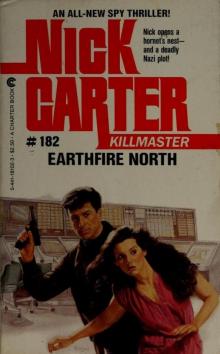 Earthfire North
Earthfire North Beirut Incident
Beirut Incident White Death
White Death Night of the Warheads
Night of the Warheads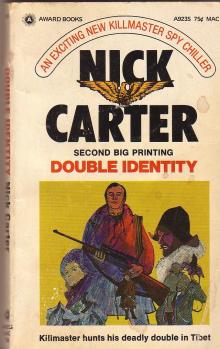 Double Identity
Double Identity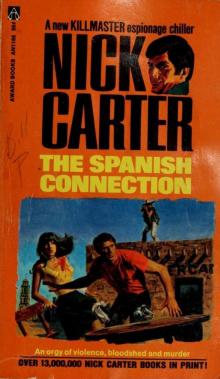 The Spanish Connection
The Spanish Connection Rhodesia
Rhodesia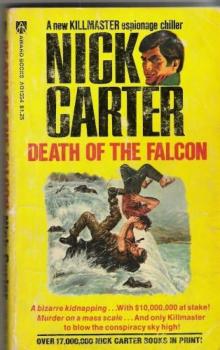 Death of the Falcon
Death of the Falcon The Executioners
The Executioners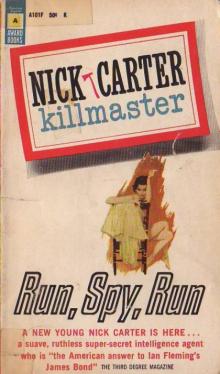 Run, Spy, Run
Run, Spy, Run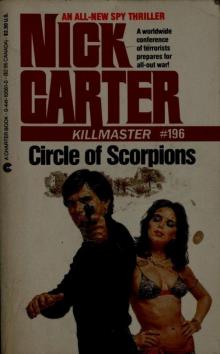 Circle of Scorpions
Circle of Scorpions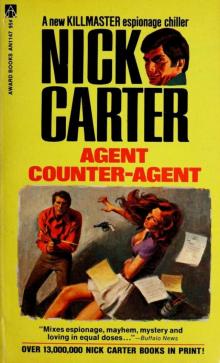 Agent Counter-Agent
Agent Counter-Agent The Living Death
The Living Death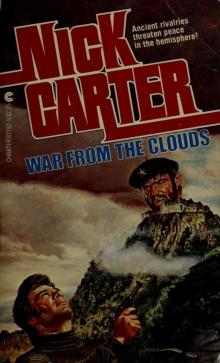 War From The Clouds
War From The Clouds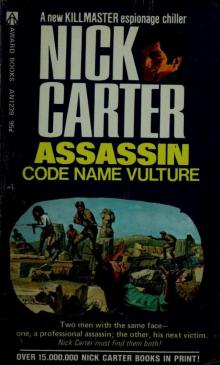 Assassin: Code Name Vulture
Assassin: Code Name Vulture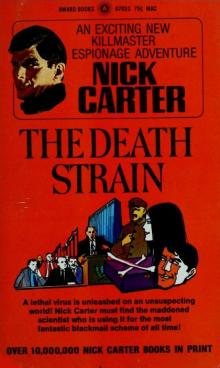 The Death Strain
The Death Strain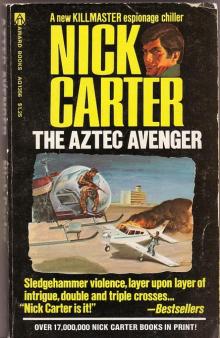 The Aztec Avenger
The Aztec Avenger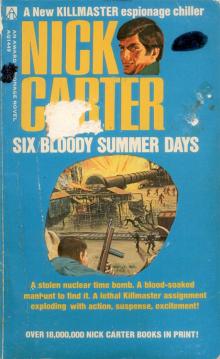 Six Bloody Summer Days
Six Bloody Summer Days Operation Petrograd
Operation Petrograd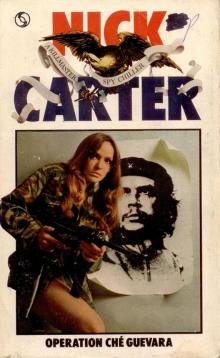 Operation Che Guevara
Operation Che Guevara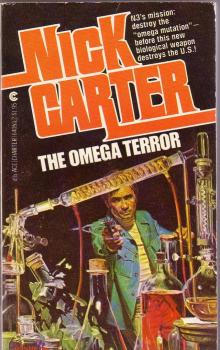 The Omega Terror
The Omega Terror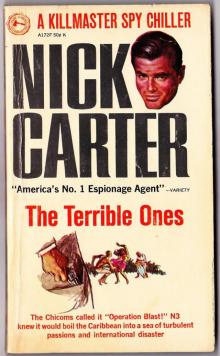 The Terrible Ones
The Terrible Ones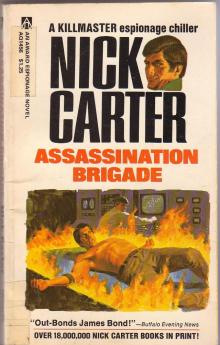 Assassination Brigade
Assassination Brigade Assault on England
Assault on England The Judas Spy
The Judas Spy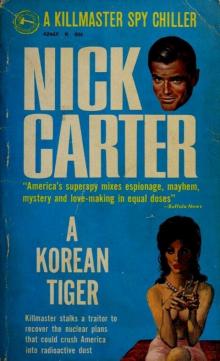 A Korean Tiger
A Korean Tiger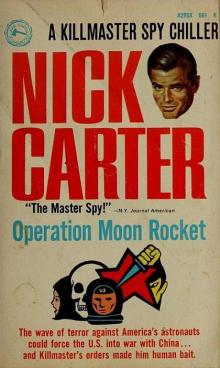 Operation Moon Rocket
Operation Moon Rocket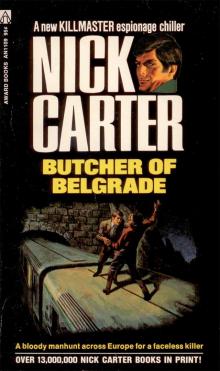 Butcher of Belgrade
Butcher of Belgrade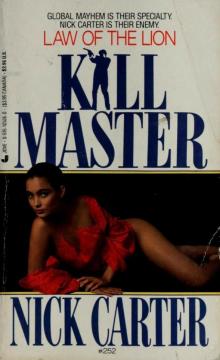 Law of the Lion
Law of the Lion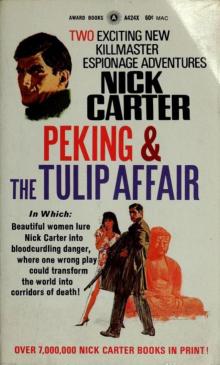 Peking & The Tulip Affair
Peking & The Tulip Affair Death Island
Death Island The Jerusalem File
The Jerusalem File The Defector
The Defector The Fanatics of Al Asad
The Fanatics of Al Asad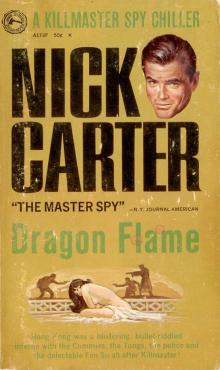 Dragon Flame
Dragon Flame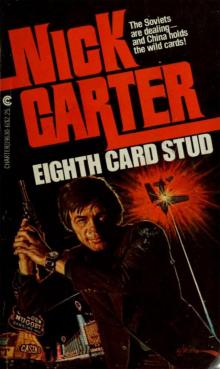 Eighth Card Stud
Eighth Card Stud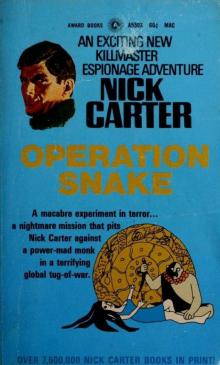 Operation Snake
Operation Snake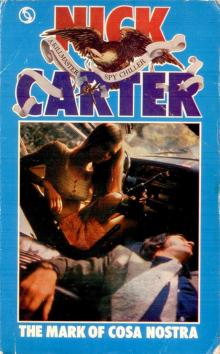 The Mark of Cosa Nostra
The Mark of Cosa Nostra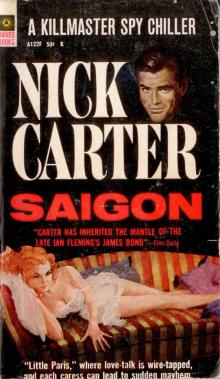 Saigon
Saigon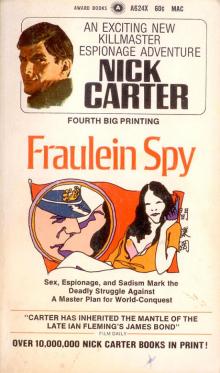 Fraulein Spy
Fraulein Spy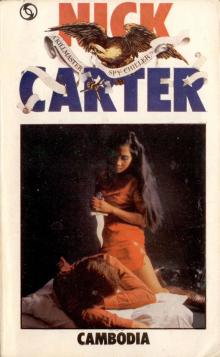 Cambodia
Cambodia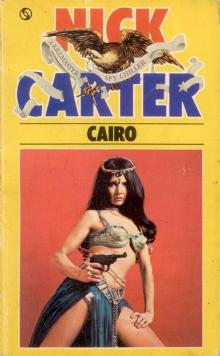 Cairo
Cairo